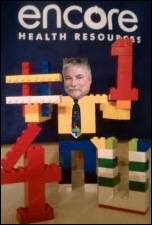Hopefully it's not through MyChart, but I've definitely heard of Secure Chat (Epic's internal messaging system within Hyperspace and Haiku)…
News 11/19/10
From Karen: “Re: Meaningful Use: Doctors Have No Choice. Written by my husband, but still true!” Jim O’Connor, MD of MDcohort makes the argument that Meaningful Use isn’t as voluntary as it sounds, offering as evidence: (a) CMS will start imposing penalties on EMR non-users in 2015; (b) private insurers will tie MU to their P4P programs; (c) MU will apparently be made a requirement for renewal of board certification; (d) states can impose their own penalties, possibly even requiring MU for medical license renewal.
Ed Marx has a lot of fans here, so if you want to read more from him, he has posted a special article about his relationship with his daughter on Texas Health Moms, a site managed by his employer, Texas Health Resources.
Listening: new from Guster, which I’ve mentioned before. Solid, harmony-driven alt-pop (kind of R.E.M.-y to me), but they’re also funny: they enlist fans to sell CDs and sometimes open their own shows in disguise. If you’ve heard any of their stuff, it was probably Satellite.
Timing is everything: just after Aurora Health Care (WI) announces plans to eliminate 175 jobs in a cost-cutting effort, the press gets wind of the $8.2 million its former COO was paid upon his retirement last year. They make the standard excuses (accrued benefits, they have to compete with for-profits anxious to hire away executives who have spent their entire lives in healthcare, etc.) but I note that they paid the CIO $739K and the CEO got over $2 million according to their most recent tax filings. They have 30,000 employees, so maybe that seems reasonable by inflated non-profit salary standards these days. We may suck at population health in this country, but we lead the world in the executive-to-grunt compensation ratio.
The Aurora guy, who wasn’t even the CEO, made even more than Cerner CEO Neal Patterson, who took home $3.3 million in 2009, a little less than he made in both 2007 and 2008. And speaking of Neal, I’m clearly not at his level of business acumen because this just seems weird: he and Cliff have renamed their soccer team from the Kansas City Wizards to Sporting Kansas City. They’re doing some kind of membership thing, apparently, but that name sure make a weird fan cheer. 
Think this will reduce healthcare costs? Mayo Clinic is building proton-beam cancer treatment centers at its Minnesota and Arizona locations. The price tag: $370 million.
On the sponsor-only HIStalk Jobs Page: Director Technical Readiness, Implementation Consultants and Project Managers, Healthcare Consulting Leader, Account Executive. On Healthcare IT Jobs: Program Manager IT Implementation, HED AdminRX HArx Remote, Implementation Engineer – Integration, Epic Inpatient Opportunities.
A New York Times article describes the problems San Francisco Department of Public Health is having with its $11.2 million Avatar EMR from Netsmart. Conversion problems caused delays in Medi-Cal payments to individual therapists and some therapists and social workers are complaining that using the software is eating into time for patient care. A post-implementation audit showed that mental health services volume dropped by 55% and substance abuse by 32%, with the deputy financial officer concluding that, “It’s pretty clear none are getting Avatar.” A social worker agreed: “This is not the job we accepted when we chose to do clinical work for the city.”
Strange: a Walmart pharmacist is disciplined by the Maine regulatory board for dispensing zolpidem instead of Zoloft to a patient. Before his own drugstore went bankrupt, he was also found to have overbilled the state by $1.6 million. The odd part: he’s a state representative in line to become the next speaker of the House.
In Australia, iSoft misses the deadline to reorganize its loans, triggering higher interest rates that may force the company to sell assets. Shares are down 88% for the year, currently at 9 cents, with market cap under $100 million. The company’s annual shareholder meeting is in a couple of weeks, which should be a blast.
The VA will develop two prototypes of Aviva, a virtual implementation of its VistA system and its apparent replacement, according to its just-released Fiscal Year 2010 Performance and Accountability Report. I thought they already had demonstrated the prototype earlier this year, but maybe this is something new.
Verizon will offer free credentials to providers in starting in January that will allow access to its Verizon Medical Data Exchange. It offers a provider portal, a secure inbox, and connections to the Verizon Health Information Exchange.
HERtalk by Inga
From MrSoul: “Re: Kindle It. Encourage your readers to tell the publisher of Connected for Health to publish in Kindle so we can read it on our iDevices! There is a link on Amazon to do just that and then they can have this great resource always on hand.” I would think a book like this would already be in digital format!
West Penn Allegheny Health System selects athenahealth’s RCM service for its 600-doctor physician organization. They are apparently replacing GE’s RCM product. On the EHR side, they use Allscripts.
Venture capital firm OpenView Partners makes a minority investment in Prognosis Health Information Systems. Prognosis CEO Ramsey Evans says that OpenView’s investment will allow the company to “move forward and take our business to the next level.”
North York General Hospital in Toronto goes live with 300 order sets, using tools from Zynx Health’s ZynxOrder and integrating them into Cerner EHR.
CMS says the error rate for Medicare fee-for-service claims in 2010 dropped to 10.5%, or $34.3 billion in estimated improper claims payment. That’s down from 2009’s $35.4 billion in payment errors. I guess we should all be thrilled that CMS is getting better, but I am stuck thinking about all the better ways that $34.3 billion could have been spent.
The Stone Center of New Jersey IPA signs a 15-month contract with iMedicor to connect its 120 urologists into iMedicor’s National Health Communications Network.
Central Maine Healthcare eliminates 20 jobs as a result of outsourcing its medical transcription to Precyse Solutions. Precsyse offered positions to all 20 employees, though only 10 accepted. The move to outsourced transcription is part of a $11 million cost-cutting initiative.
Health management company Continuum Health Alliance contracts with Ignis Systems to provide integrated lab orders management for its EMR application services.
The Indian Health Service (IHS) commits to a $3.3 million contract with Orchestrate Healthcare and Vangent to plan, implement, and support the national deployment of the IHS HIE, enterprise MPI, and NHIN capability. Vangent’s HIEOS open source software will be used to establish connectivity between IHS facilities and the NHIN.
Miami-Dade County Commissions tell Jackson Health System to cut ties with the company handling its international marketing after a recent report details excess spending for such things as flowers and birthday cakes ($7,000), local meals ($37,000), and limo rides ($12,000). An additional $6,000 was spent on a Royal Caribbean cruise for five of the marketing firm’s senior executives and their families. Foundation Health Services was the organization handling the health system’s international marketing efforts. It’s a not-for-profit, so I guess the execs had to get their perks from somewhere.
Teleradiology service provider Century Digitec Services goes live on eRAD’s hosted teleradiology software platform.
A study of 15 IDNs leads the Government Accountability Office to declare that EHRs can improve the quality of healthcare, making patient information more readily available and improving communication and coordination between providers. Providers still face challenges in terms of maximizing their use of EHRs, including limitations on sharing patient records outside their health system.
New on HIStalk Practice this week: 15 HIT vendor execs share what their company is doing to help physicians qualify for Meaningful Use. Evan Steele of SRSsoft provides commentary on the Meaningful Use challenges for specialists. Fun details on the eClinicalWorks national user conference, including a party pic with a uniquely attired CEO Garish Navani. And, the EHRevent patient safety reporting system. There’s a bunch of other good stuff as well, none of which you will find on HIStalk. Make sure you remain smarter than your co-workers and take a read.
"But Inga,” you say. “I’m too busy, just give me the highlights.” For grins and because I believe it’s important stuff, here’s a short summary of what the HIT vendor execs had to say about helping providers reach Meaningful Use:
- Several are incorporating dashboard tools or similar reports to help providers assess EHR usage based on Meaningful Use requirements.
- Most are offering webinars; many are setting up regional meetings to educate users on what needs to be done; most have online tools available; and, most mention the option for personal assistance, either on-site or remotely.
- Only a couple mentioned working with regional extension centers to share expertise and help beef up local infrastructures.
- Allscripts and athenahealth remind users that they offer Meaningful Use guarantees.
- Not surprisingly, some of the vendors have nicely packaged answers, which to me suggests (a) the vendor has established a clear-cut plan, or, (b) the vendor has a great marketing department, or (c) both.
- A couple are short on specifics and don’t say much more than vendors needs to help physicians in the process.
- Jonathan Bush of athenahealth wins the prize for the most entertaining answer.
- Evan Steele of SRSsoft has the most unusual reply, saying the company has spent considerable time reviewing the requirements and are helping its clients make an informed decision as to whether participation is right for the individual practice.
Sponsor Updates
- Encore Health Resources had a contest to see who could do something creative with 100 Legos in celebrating the hiring of the company’s 100th employee. Above is one of the submissions by employee Paul Murphy, who went with a multimedia strategy with an Ivo bobble head approach. I was thinking that I could have cheated and added extra Legos and come up with something spectacular.
- Nuance Communications introduces Nuance Transcription Services, which combines the eScription speech recognition platform with medical transcription and editing services from two of Nuance’s newly acquired companies, Outsource Solutions and Encompass Medical Transcription.
- MEDecision earns NCQA HEDIS software certification for its Alineo Clinical Intelligence Rules 2.4.0 and 2.5.0 programs.
- CareTech Solutions launches CareWorks 4.0, which includes enhancements in audit reporting, directory utilities, and several mobile modules.
- Fast-growing EnovateIT will move its headquarters from Ferndale, MI to Canton. The company’s mobile and wall-mounted computer workstations are used a third of the hospitals in he US, with last years $19 million in sales expected to reach $35 million this year.
- dbMotion appoints Prematics president and CEO Keving Hutchinson to its board of directors.
- 3M Health Information Systems and IQMax partner to offer 3M’s coding and documentation tools using IQMax’s mobile healthcare platform.
- Hayes Management Consulting will provide its Legacy Application IT Help Desk services to Moses Cone Health System as they transition from GE Centricity Enterprise to Epic.
- South Australia’s Public Health System names Allscripts its vendor of choice to provide EHR to its 80 hospitals. The agreement to purchase Sunrise Enterprise 5.5 is subject to contract negotiations, with final approval expected during the first half of 2011.
- Sage is named a group purchasing EHR vendor by PA REACH, which will offer Sage Intergy Meaningful Use edition to providers at a discount.
- A new KLAS report on ED solutions names Epic and Wellsoft as tying for the top spot.











Verizon’s effort to issue digital credentials raises “Net Neutrality” issues. Verizon is asking the government for a carve-out from net-neutrality regulations in order to process large healthcare transactions, like those involved with telemedicine.
It would seem that Verizon wants to control healthcare information exchange, however. If Verizon also gets a net-neutrality carve-out, then it can give preference to its transactions on its network.
The term Sporting when applied to a football club is not unusual. Here are a few examples of clubs that have been established for many years that use such a name: Sporting Cristal (Peru), Royal Sporting Club Anderlecht (Belgium), Real Sporting de Gijón (Spain), Sporting Fingal (Republic of Ireland). Most well known perhaps are Sporting Clube de Portugal (they played a series of pre-season friendly matches in the states this summer) whom are often referred to as just ‘Sporting’ or Sporting Lisbon.
In a perfect world iSoft would be bought out by Pfizer.
Meaningful use was attempted in San Francisco but it turned into a meaningful disaster. I like the comment by the VP who said it was going “swimmingly well”.
Re: GAO report
From that report:
…However, the information we present is from the perspective of the IDSs in our sample. We relied on data obtained through the Web-based data collection instrument, interviews with system representatives, and published studies and did not conduct independent analyses of the effectiveness of strategies.
This report suffers a serious flaw: potential (or might I say likely) self-reporting bias. Caveat emptor.
On a different note, stories like the one today at the WSJ “Insurers Test Data Profiles to Identify Risky Clients” (link) disturb me.
From that story:
Life insurers are testing an intensely personal new use for the vast dossiers of data being amassed about Americans: predicting people’s longevity.
Insurers have long used blood and urine tests to assess people’s health—a costly process. Today, however, data-gathering companies have such extensive files on most U.S. consumers—online shopping details, catalog purchases, magazine subscriptions, leisure activities and information from social-networking sites—that some insurers are exploring whether data can reveal nearly as much about a person as a lab analysis of their bodily fluids.
In one of the biggest tests, the U.S. arm of British insurer Aviva PLC looked at 60,000 recent insurance applicants. It found that a new, “predictive modeling” system, based partly on consumer-marketing data, was “persuasive” in its ability to mimic traditional techniques.
The research heralds a remarkable expansion of the use of consumer-marketing data, which is traditionally used for advertising purposes.
The reason I find this disturbing is that it can and probably should be looked at as another example of technophiles and opportunists with no knowledge of (or lack of caring about) social informatics, e.g., the unintended consequences of new information and communications technologies, enabling our society to move one step closer to centralized control.
Stories such as the above WSJ story, and others in their running series on Internet privacy, also dampen my enthusiasm about the possibility that electronic medical information will be kept private, confidential and secure.
RE:MIMD
Your concern about data being kept private is legit and we certainly haven’t seen the last of using consumer marketing data to drive decisions in other fields.
If you like being paranoid about all that data that is simply out there and available about you, you might consider listening to a talk given by private investigator Steven Rambam titled “Privacy id dead” given at a conference in NY last July:
http://c2047852.cdn.cloudfiles.rackspacecloud.com/tnha18a.mp3
http://c2047852.cdn.cloudfiles.rackspacecloud.com/tnha18b.mp3
toast says:
If you like being paranoid about all that data that is simply out there and available about you, you might consider listening to a talk given by private investigator Steven Rambam titled “Privacy id dead”
Thanks for the links.
The major problem I see with “privacy being dead” in medicine is the effect it can and will have on the veracity of patients and the clinical history they provide. I treated many difficult historians, often due to cognitive problems. It was a challenge. Now, it seems clinicians will have to worry about what the patient might deliberately not be mentioning.
S.
To echo the comments above about Sporting Kansas City, there has been a trend in MLS to name the teams in accordance with European superclubs. Hence we have DC United, FC Dallas, Real Salt Lake, and Houston Dynamo. Manchester, Barcelona, Madrid, and Kiev, respectively, are the inspiration for these names; there are no actual relationships between the Euro and US clubs, just the name imitation game. Now Sporting Lisbon, a famous Portuguese club, appears to have found an admirer in KC.